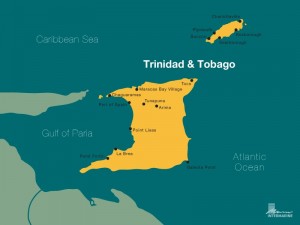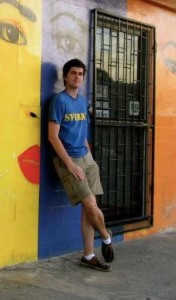Editor’s note: Karl is current student at Evergreen. He recently spent three months studying in Trinidad.
When enrolled in Caribbean Cultural Crossings in 2010 for my first quarter at Evergreen, I never imagined two and half years later I would find myself in the bustling Caribbean metropolis of Port-of-Spain, Trinidad. In Caribbean Cultural Crossings, we explored the region’s literature, history, film, biodiversity, music, and art. Additionally, we learned and applied political economy and post-colonial theory to further understand the Caribbean.
In the end, the program did shape the future of my academic career; not only did it expose me to new subjects, but the program and the community within it gave me the confidence to actually pursue my interests in such subjects. It was toward the end of Caribbean Cultural Crossings that, for my final project, I dissected the nutritional benefits, cultural influences, and historical factors that shaped the dish Jamaican Jerk Chicken.
Coming from a traditional boarding school background where I couldn’t have explored the subjects I was truly interested in, I found myself constantly asking: “Can I get credit for this?” At Evergreen, the answer was, of course, yes.
 Trinidad – As I shuffle through crowded markets, converse with street vendors, and try my hand at making a variety Trinidadian dishes, I can clearly see the seeds of my interests in that program. My studies here in Trinidad, through the 2012-2013 year-long program America Abroad, I have focused on the history and culture surrounding food and its related nutritional value.
Trinidad – As I shuffle through crowded markets, converse with street vendors, and try my hand at making a variety Trinidadian dishes, I can clearly see the seeds of my interests in that program. My studies here in Trinidad, through the 2012-2013 year-long program America Abroad, I have focused on the history and culture surrounding food and its related nutritional value.
this is of particular importance in the light of a massive increase in international fast-food franchises establishing themselves in the region juxtaposed with a political movement in Trinidad seeking self-sufficiency in domestic food production. Globally, we see massive changes in the way food is produced and consumed. Trinidad is no less influenced by this trend than any other nation. So what does this mean for a nation that is only slightly larger than Rhode Island, and how can this serve as a model for the future of the rest of the world? Though I am only halfway through my project as I write, I am seeing a mix of interesting, frightening, and hopeful signs along the way.
Easy as it would be to reflect on my experiences as a result of my own doing, I wouldn’t be here without the support of the greater Evergreen community. Last year, I received the 2012-2013 Jessica Kelso Memorial Scholarship, an award supporting international study. This is a constant reminder of why it is easy to get so incredibly excited by Evergreen. We do not just talk about the importance of involving imagination, creativity, and innovation in and outside of the classroom; the students, faculty, staff, alumni, and members of the greater Evergreen community are given opportunities to live it every day. No other institution in the United States (dare I say the world?) does things quite like we do. When I share the concept of Evergreen here in Trinidad, the most common responses are either a) “That’s so cool!” or b) “Wow that makes a lot of sense.” Because of the encouragement and support Evergreen has provided me academically, emotionally, and financially I feel that I stand among a community of people who are shaping the world for the better. We are more than just a school in my mind: we are the embodiment of an idea, a vision of what we are all capable of achieving when we move together.
All the best,
Karl


